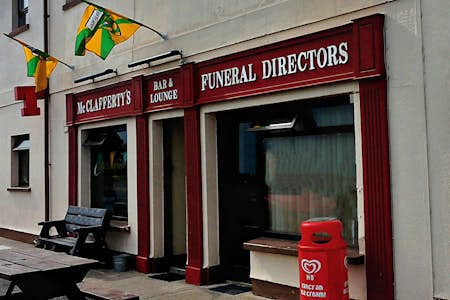Going six feet under might seem like an easy choice when you’re dead. Finding a place to descend back to the Earth is something to think about before you go the great beyond.
Around 140,000 burials happen each year in the UK. That's a lot of holes in the ground needed across the country! Although there's a shortage of burial plots, you still have options and can plan ahead to take the headache away from your loved ones.
To help you choose the type of burial you want, or give you options when someone close has slipped away, let’s look at:
- Getting buried in a cemetery
- How to get buried at home
- Natural burial options
- Taking a body overseas for a burial
- Organising a burial at sea
How do I arrange a cemetery burial?
Spots in cemeteries are in short supply across the country. This can mean high prices for the exclusive right of burial – meaning you get to decide who goes in the plot you buy.
Up to two people can join you down there; be sure to specify who gets to decide your grave-fellows in your will when you buy ahead of time.
Funeral directors can help you arrange a burial plot. If you're the independent type, contact your local authority and deal with them directly. You'll get a lease on the plot for anywhere between 25-100 years, at which point more bodies can go in with you, but you'll likely not get moved.
Priority for burial spots will go to local residents. When you’re from outside the local authority area, your fees will be higher than if you were a local.
How do I get buried in a graveyard?
A graveyard is a cemetery attached to a church. You’ll need to buy a plot from the church rather than your local authority.
You don't have to be of a particular religion to be buried in a churchyard. However, you may face more restrictions on what can go on your headstone in a religious site.
Is it legal to bury a body in your garden?
As long as you follow the proper rules and register the death correctly, nothing stops your body from being buried in your garden or somewhere on your land. The rules to abide by are:
- You can't be less than 250 metres from a drinking water well, borehole, or spring.
- You must be at least 30 metres away from any other water course.
- The plot must be 10 metres from a field drain or dry ditch.
- There has to be at least one metre of soil between the top of your coffin/cloth and the surface.
- You can't be buried below the water table.
- You'll need permission from the freehold owner, who must check if there are covenants about burials on the land.
It's not obligatory to tell your local council you're planning on burying someone at home. However, the local Environment Officer will be the one to advise you about the water issues in your area. A quick call to the local police might be a good idea, too, so they don't think you're up to anything illicit.
Can I get buried without a coffin?
Burials without a coffin are possible in natural burial sites. These are cemeteries that aren’t manicured lawns and grey headstones – you go under in a forest or scrubland.
Although coffins are allowed at natural burial sites, they'll need to be made of natural materials and contain no metals. Your body can be covered in anything, as long as it's biodegradable.
Most natural burial grounds won't allow embalming, and grave marker rules will vary. Your funeral director should know about your local options and what regulations you and the ones left behind will have to play by.
How do I organise to get buried overseas?
If you weren't born in the UK, or you particularly love another country, it's possible to get buried outside the UK. It's not cheap, and there's a lot more paperwork that goes into it, but it's doable, and you can plan ahead.
First, you need a zinc-lined coffin, and you have to be embalmed – that's the law. You also need to have the arrangements already in place for the burial in the other country. If you don't, then airlines can decline to load your body as cargo,
To start this process, you should contact the UK embassy or high commission for the country you want to be buried in. From there, get as much in place as possible to take the strain from everyone who you leave grieving.
Can I be buried at sea?
Although not the most common burial option, getting buried at sea is legal, often cost-effective, and isn't exclusively reserved for former sailors. The license to be buried at sea costs £175 from the Marine Management Organisation, and there are guidelines about your clothing and coffin construction.
You’ll need to pay a company to take your body out to one of three designated resting places. If you have a spot in mind, you can apply to be buried somewhere else as long as there’s little risk of you floating ashore or getting netted with a school of cod.
Where can I get buried?
Official burial plots in the UK are finite and running out fast. You can bag yourself a spot in a cemetery ahead of time and cover the costs whilst you're still around. A natural burial ground can be cheaper than a local authority one, as long as you're prepared to follow their directions about your coffin, or lack thereof.
Going into the ocean or to a far-off land are also viable options.
Sarah Smart, Director at Mid-England Barrow, offered another excellent alternative. Sarah told Pension Times: "One of the alternatives available is to place loved ones ashes in a modern round barrow. Family may visit whenever they wish, and don’t have to take responsibility for any upkeep, so all the time spent visiting can be to pay respects. What's more, pets' ashes can sit alongside their owner in the barrow, just where they were in life."
Your loved ones will probably never consider these, so get things in place before you pop off to get the funeral you want!








